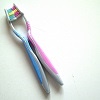
Tooth decay is the most chronic health concern in children. It can lead to pain, infection, malnutrition, poor weight gain and the premature loss of baby teeth, which can affect the development of strong, healthy adult teeth.
Here is a breakdown of what is important for good oral health at the different stages of a child's life:
From birth to age three
The presence of cavities and bleeding gums in baby teeth increases the chances for these problems in the adult teeth. Good oral health habits at home are essential and, if started early, will increase the opportunity for a healthy mouth as your child grows up through adolescence into adulthood.
Why are primary teeth important?
The primary or baby teeth are important for jaw growth, appearance and speech. But, most importantly, a child's baby teeth retain the spacing for his/her adult teeth. The baby teeth fall out and are replaced by adult teeth as the child develops and grows. The leading cause of crowding in adult teeth is due to the premature loss of baby teeth and tooth decay.
From three to six years
By three years, most children have 20 primary (baby) teeth. At this stage, the parent should be checking for spacing between the teeth.
Spacing between the upper and lower front teeth will ensure that the larger adult teeth have the space they need to grow properly. If the front baby teeth are crowded, more jaw growth will be needed to accommodate the adult front teeth. Spaces between the back teeth also mean there is less chance for tooth decay to develop, provided the spaces are cleaned regularly or are self cleansing.
Six to 12-year-olds
Most children's adult teeth start to erupt at around six years of age. However, some children don't get their first adult tooth until after the age of seven or later. When eruption is delayed, it is important that a dentist determines, through an x-ray, that all the adult teeth are present in the jaw and show signs of erupting, that there aren't any bite or eruption problems and that all the teeth are clean and healthy.
Some children start losing their baby teeth early (from four-and-a-half years) and some later (seven to eight years old). Usually, the lower front incisors or the molar teeth are the first to appear.
Adolescents
Hormonal changes that come with puberty may make gums very sensitive for both boys and girls. Gingival (gum) tenderness and bleeding gums are common with menstruation.
This is an important time for teens, as they are in the process of developing their own sense of the value of oral health. Attitudes about health and self are very intertwined. Teens often feel pressurised to start smoking, use smokeless tobacco, alcohol and drugs, which are concerns for all parents and have a negative impact on oral health.
Parents should keep communication open with their children. Be aware and sensitive of their feelings, moods and behaviour, and inform them on issues that you feel should be important to them, such as their health, for instance.
Problems and prevention for adults
The health of your mouth is as important as the health of any other part of your body. The most common of all health problems are mouth infections.
The health of your teeth affects your daily comfort, nutrition, self-esteem and appearance. Frequent smoking, chewing tobacco and alcohol use increase your risk of developing oral cancer. Mouth infections increase the risk of heart disease, diabetes, ulcers and other health problems.
Source: South African Dental Association




 Publications
Publications
 Partners
Partners











